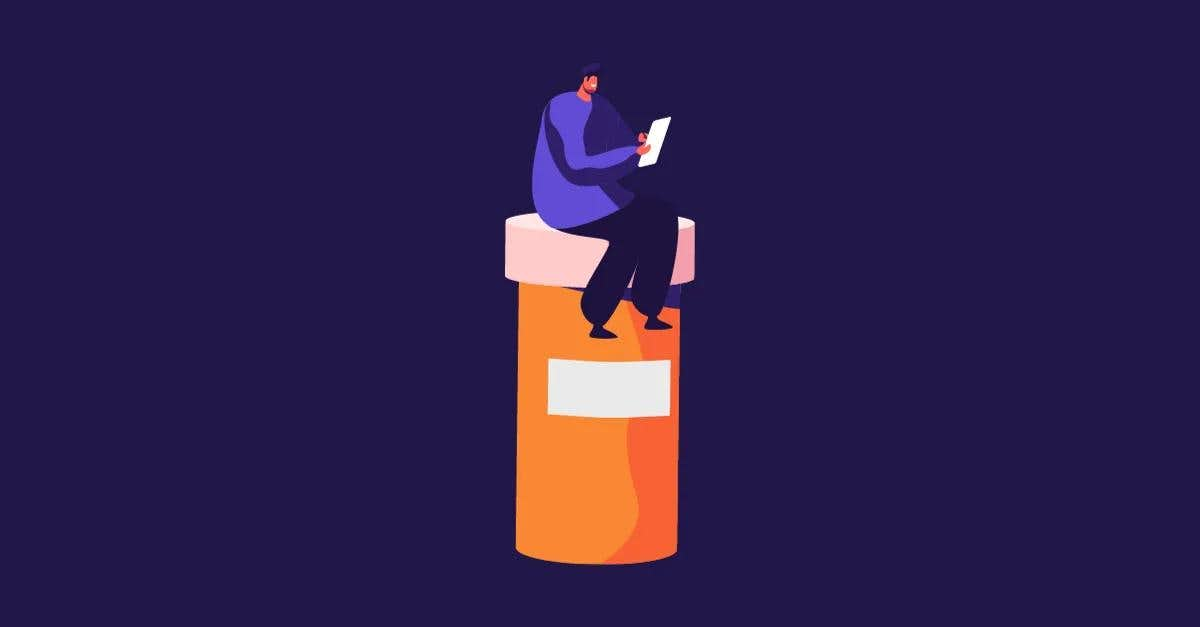September 26th, 2023

Antidepressants are some of the most commonly prescribed medications in the United States today. Overall, antidepressants are widely considered to be relatively safe medications with good efficacy in treating a variety of mental health conditions. There are risks associated with the usage of any medication such as medication side effects, symptoms related to dosage adjustments, as well as abuse, misuse, and addiction potential that must be considered.
Although antidepressants have not been shown to have the potential for addiction, it is important to explore other considerations associated with antidepressant use in the treatment of mental health conditions with patient safety at the forefront.
According to the 2017 report by the Centers for Disease Control and Prevention “Antidepressant Use in Persons Age 12 and Over, United States,” 12.7% of the American population were prescribed antidepressants within the past month. The widespread use of antidepressant medication is due to a combination of factors including their efficacy, broad spectrum of activity, general affordability in cost, ease of use, and safety.
Antidepressants are indicated for a variety of diagnoses including but not limited to major depressive disorder, generalized anxiety disorder, panic disorder, social anxiety disorder, post-traumatic stress disorder, and obsessive-compulsive disorder. Additionally, antidepressants are approved to treat premenstrual dysphoric disorder and eating disorders, such as bulimia nervosa, as well as off-label uses including the treatment of negative symptoms of schizophrenia, impulse-control disorders, and borderline personality disorder.
Antidepressants act on increasing the activity of neurotransmitters, such as serotonin, norepinephrine, and dopamine to positively impact and regulate mood. There are several classes of antidepressants, each with different indications, side effect profiles, and drug interactions. Selective serotonin reuptake inhibitors (SSRIs) are the most commonly prescribed class of antidepressants that work by inhibiting the reuptake of serotonin, thereby increasing serotonin availability and activity in the brain, and improving mood.
Common side effects of SSRIs include headache, dry mouth, nausea, diarrhea, alterations in sleep, and sexual dysfunction including decreased libido and delayed orgasm. Other antidepressant classes include serotonin/norepinephrine reuptake inhibitors (SNRIs), serotonin modulators, tricyclic antidepressants (TCAs), monoamine oxidase inhibitors (MAOIs), and atypical antidepressants.
Notably, the FDA issued a “black box” label indicating that the use of certain antidepressants may increase the risk of suicidal ideations or behaviors in children and adolescents.

Addiction is a disorder that is characterized by compulsive drug-seeking behavior and drug use despite adverse consequences which involves functional changes to brain circuits regarding reward and self-control. Characteristics of addiction include long-term, harmful chemical changes in the brain, inability to control substance use as well as negative consequences of substance use, making addiction treatment long-term and multifactorial.
Addictive substances tend to produce feelings of euphoria, cravings, or a strong desire for the substance, and the need to increase the amount of the substance used to achieve the same effect over time.
Antidepressants do not create the euphoric feeling of other potentially addictive substances and people generally do not develop cravings for their antidepressant. While antidepressant addiction has not been substantiated, dependence on antidepressants may occur.
Dependence differs from addiction in that dependence is a state of bodily adaptation caused by regularly taking medication as evidenced by withdrawal symptoms associated with dose reduction or discontinuation without the cravings and compulsive drug use associated with addiction.

Any pharmacologically active agent may result in the development of tolerance to the agent as well as withdrawal symptoms associated with cessation of the agent. Therefore, although antidepressants are not considered to be addictive substances, withdrawal symptoms may occur with abrupt discontinuation of antidepressant use.
As antidepressants work by altering the levels of neurotransmitters, the body grows accustomed to the drug and its effects over time. Discontinuation syndrome can result from abrupt dosage reduction or discontinuation of an antidepressant especially if a medication has been taken longer than four to six weeks.
Approximately 20% of patients who stop or markedly reduce the dosage of an antidepressant after taking it continuously over one month develop antidepressant discontinuation syndrome.1 Certain antidepressants are more likely to cause withdrawal symptoms than others.
Symptoms of discontinuation syndrome are typically mild, beginning two to four days after cessation of a drug and lasting one to two weeks. Common symptoms of antidepressant discontinuation syndrome include insomnia, nausea, muscle aches, fatigue, dizziness, vivid dreams, sensory disturbances such as electric-shock-like sensations or “brain zaps,” and irritability or agitation.
To minimize the risk of discontinuation syndrome associated with antidepressants, the dosage of antidepressants should be gradually reduced over several weeks while monitoring for risks and side effects to allow time for the body to adjust to changing levels of medication.
It is additionally important to recognize that as discontinuation symptoms resolve over time as the body readjusts, symptoms of depression or other underlying disorders may recur. Therefore, it is important to follow up with your medical provider to address any concerns and/or changes in mood during periods of antidepressant medication adjustments.

There are many risks associated with antidepressant misuse and abuse when antidepressants are not taken as prescribed. Misusing antidepressants may lead to uncontrolled symptoms of depression, anxiety, or other underlying conditions that may continue or worsen without proper treatment. Taking an increased amount or dose of an antidepressant can lead to serotonin syndrome, a condition that can be life-threatening if not detected or untreated.
Serotonin syndrome results from the build-up of high levels of serotonin in the body leading to gastrointestinal effects such as nausea, vomiting, and diarrhea as well as agitation, restlessness, tremors, muscle rigidity, hyperthermia, and delirium in severe cases. This can be a life-threatening consequence of antidepressant abuse that needs to be identified and treated as soon as possible.
There are many factors patients and healthcare providers must consider when it comes to prescribing and taking antidepressant medications. Antidepressants are very effective and beneficial in treating a variety of mental health conditions, but it is essential to also recognize risks associated with antidepressant use such as dependence, withdrawal symptoms, as well as dangers of medication abuse and misuse.
Regular monitoring and risk assessment measures should be implemented throughout antidepressant treatment to ensure patient safety is continually prioritized and remains the focus of treatment of mental health conditions.
Disclaimer: The information on this page is for educational and informational purposes only and is not a substitute for professional medical advice, diagnosis, or treatment. Always consult a qualified healthcare provider with any questions regarding a medical condition or treatment. Never ignore or delay seeking professional help due to information found here.
. At Clarity Clinic, we provide mental health care for individuals seeking support with anxiety, depression, trauma, and other emotional challenges. While we do not offer addiction treatment or detox services, we welcome individuals in recovery from substance use who are stable and ready to focus on their mental health.
For those actively using substances, a higher level of care may be necessary before engaging in meaningful therapy.
We can provide referrals to external substance use treatment centers and welcome clients back once they are stabilized and ready to work on improving their lives post-treatment. Our team is here to support your mental well-being, whether you’re navigating the emotional impact of past substance use, relationship changes, or other life transitions
References
Schatzberg AF, DeBattista C. Schatzberg’s Manual of Clinical Psychopharmacology. 9th ed. American Psychiatric Association Publishing; 2019.
Jauhar S, Hayes J, Goodwin GM, Baldwin DS, Cowen PJ, Nutt DJ. Antidepressants, withdrawal, and addiction; where are we now? J Psychopharmacol. 2019 Jun;33(6):655-659. doi: 10.1177/0269881119845799. Epub 2019 May 21. PMID: 31111764; PMCID: PMC7613097.
1Gabriel M, Sharma V. Antidepressant discontinuation syndrome. CMAJ. 2017 May 29;189(21):E747. doi: 10.1503/cmaj.160991. PMID: 28554948; PMCID: PMC5449237.
National Institute on Drug Abuse
Our Services
Virtual/Online CarePHP and IOPAdult PsychiatryChild & Adolescent PsychiatryAdult TherapyChild & Adolescent TherapyCouples CounselingFamily TherapyGroup TherapyPsychological TestingTranscranial Magnetic Stimulation (TMS)